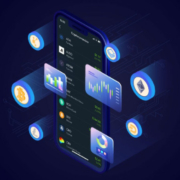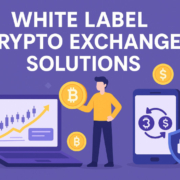Tokenizing Real World Assets: Why White Label Solutions Are Gaining Popularity
What if your real estate, artwork, or even carbon credits could be traded on a blockchain just like Bitcoin? This isn’t a distant dream anymore. Tokenizing real-world assets (RWAs) has become one of the most exciting applications of blockchain technology. With this rising trend, many businesses are turning to White Label Tokenization Platforms to simplify their entry into this promising market.
In this blog, we’ll break down what tokenization of real-world assets means, why white label solutions are booming, and how they apply to sectors like carbon credits, banking, and crypto exchanges.
What is Tokenization of Real-World Assets (RWAs)?
Tokenization is the process of converting rights to an asset into a digital token on a blockchain. These assets can include:
- Real estate properties
- Fine art and collectibles
- Stocks and bonds
- Commodities like gold and oil
- Carbon credits
Each token represents a share of the underlying asset, providing a way to trade, own, or transfer partial ownership without the friction typically involved in traditional finance. Tokenization democratizes access, offering fractional ownership and enhancing liquidity in otherwise illiquid markets.
The Rise of White Label Tokenization Platforms
Developing a tokenization system from scratch involves considerable time, cost, and technical expertise. This is where White Label Tokenization Platforms come in. These are pre-built, customizable solutions that businesses can brand and deploy quickly without worrying about the underlying technology.
White label solutions provide:
- End-to-end tokenization processes
- Smart contract frameworks
- Regulatory compliance features
- User-friendly dashboards
- Integrated wallets and exchanges
Companies can focus on branding, marketing, and user engagement rather than complex blockchain development.
Why Are White Label Solutions Gaining Popularity?
1. Speed to Market
Launching a tokenization platform can take months or even years if built from scratch. A white label solution allows businesses to enter the market swiftly, giving them a competitive edge in emerging sectors.
2. Cost-Efficiency
Building custom blockchain solutions can cost millions. White label platforms offer a more affordable alternative, typically requiring only customization and branding expenses.
3. Regulatory Compliance
Many white label providers build their platforms with compliance in mind, incorporating KYC/AML protocols and ensuring adherence to jurisdictional regulations.
4. Security and Reliability
Established white label providers ensure their platforms are tested for vulnerabilities, ensuring data integrity and asset security.
5. Customizability
Businesses can tailor the platform to their needs, whether it’s for real estate, art, commodities, or emerging sectors like white label carbon credit trading platforms.
Key Industries Driving RWA Tokenization
1. Real Estate
Real estate is traditionally an illiquid asset class, with high entry costs and complex ownership structures. Tokenization enables fractional ownership, reducing the investment barrier and enabling global participation.
2. Art and Collectibles
Fine art and rare collectibles are perfect for tokenization. It allows investors to own a piece of a multimillion-dollar artwork, opening the doors to wider participation and secondary market trading.
3. Commodities
Assets like gold, silver, and oil can be tokenized to offer easier trade and liquidity. Commodity-backed tokens provide transparency and accessibility compared to traditional commodity trading.
4. Carbon Credits
The demand for sustainable investments is rising, and carbon credits are at the forefront. Tokenizing carbon credits on a white label carbon credit platform ensures transparency, traceability, and accessibility for companies aiming to offset their carbon footprint.
5. Financial Instruments
Stocks, bonds, and derivatives can be tokenized for easier trading, faster settlement, and global accessibility.
Benefits of Tokenizing Real-World Assets
- Increased Liquidity: Previously illiquid assets become tradable on blockchain platforms, improving market fluidity.
- Fractional Ownership: Investors can buy fractions of high-value assets, democratizing investment opportunities.
- Enhanced Transparency: Blockchain’s immutable ledger ensures transparent ownership and transaction records.
- Reduced Costs: By eliminating intermediaries, transaction costs are significantly lowered.
- Global Reach: Assets can be accessed and traded globally, broadening investor bases.
- Faster Transactions: Smart contracts automate processes, ensuring quick settlements and reducing human error.
Why Businesses Should Opt for White Label Tokenization Platforms
Businesses aiming to leverage asset tokenization need robust infrastructure, security, and regulatory compliance. White Label Tokenization Platforms offer all this in a plug-and-play format. Whether it’s for real estate, commodities, or carbon credits, these platforms simplify deployment and accelerate growth.
Moreover, white label solutions can be integrated with complementary platforms such as:
- White Label Crypto Banking Platform: Provides crypto banking functionalities like savings, loans, and asset management integrated with tokenized assets.
- White Label Carbon Credit Platforms: Enable companies to tokenize, trade, and retire carbon credits with ease, aiding in sustainability goals.
- White Label Crypto Exchange Platforms: Facilitate the trading of tokenized assets alongside cryptocurrencies, broadening liquidity options.
White Label Tokenization Platform vs. Custom-Built Solutions
| Feature | White Label Platform | Custom-Built Platform |
| Development Time | Weeks to months | 6-12 months+ |
| Cost | Moderate | High |
| Customization | High | Very High |
| Maintenance & Updates | Provider-managed | Self-managed |
| Security | Pre-tested | Needs in-house testing |
| Compliance | Built-in features | Requires legal team |
For startups and mid-sized enterprises, white label solutions are the ideal entry point into tokenization.
Future of Real-World Asset Tokenization
The market for tokenized RWAs is projected to grow exponentially in the coming years. As blockchain adoption increases and regulatory frameworks become clearer, more industries will explore tokenization.
Future trends include:
- Integration with DeFi platforms for lending/borrowing against tokenized assets.
- Expansion of tokenized carbon credits for environmental sustainability.
- Enhanced interoperability across blockchain networks.
- AI-driven asset management within tokenization platforms.
Final Thoughts
Tokenizing real-world assets is reshaping the way we perceive ownership, investment, and value transfer. The simplicity and robustness of White Label Tokenization Platforms are driving businesses to enter this space without reinventing the wheel. Whether it’s art, real estate, or carbon credits, tokenization democratizes investment and enhances liquidity like never before.
As adoption grows, integrating these solutions with a white label crypto banking platform or white label crypto exchange platform will become standard, ensuring seamless trading, management, and value transfer across asset classes.
If you’re a business looking to enter the tokenization space efficiently, collaborating with a reliable development partner like Suffescom Solutions Inc. can be your first step toward blockchain-enabled growth. Their expertise in crafting secure, compliant, and customizable white label platforms makes them a trusted choice for future-ready tokenization solutions.


